In a bid to understand the significance and scope of United States President Barack Obama's upcoming visit to India, US security expert Richard Fontaine throws some light on the bilateral ties between the two largest democracies in the world.
Fontaine is a senior fellow at the Centre for a New American Security and the co-author of the new study Natural Allies: A Blueprint for the Future of US-India Relations.
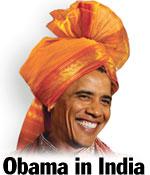
As foreign policy advisor to Republican Senator John McCain, Fontaine helped draft numerous pieces of foreign policy legislation.
He has also worked at the US State Department, the National Security Council and on the staff of the Senate Foreign Relations Committee.
During his time at the State Department, Fontaine worked in the office of former deputy secretary of state Richard Armitage and in the department's South Asia bureau, working on issues related to India, Nepal, and Sri Lanka.
Richard Fontaine had an exclusive chat with rediff.com readers on Monday evening where he discussed the presidential visit and the way forward between the two countries, and their respective stands on a range of significant issues -- from the US foreign policy to rise in visa fees.
Click here to read the full chat transcript..
'Obama's trip will be surrounded by great expectations'
Image: US President Obama returns to White HousePhotographs: Jason Reed/Reuters
dinga asked, good evening
Richard Fontaine answers, Good evening (morning here in Washington D.C.). I'm pleased to be participating in this rediff.com chat session.
sri asked, obama's agenda for India trip..
Richard Fontaine answers, President Obama's trip will be surrounded by great expectations. His is the first trip by a US president in his first term. The top item of the agenda is to demonstrate that the transformation of the US-India relationship continues. I expect that there will be a focus on export controls, defense sales, agricultural cooperation, and other items.
rich asked, Do you this the Obama trip will be a success like the George Bush one?
Richard Fontaine answers, It has the potential to be successful, even historic. All of the signals have been right thus far -- the amount of time President Obama is spending in India, the fact that he hosted Prime Minister Singh for the first State Visit of this administration, the launching of the US-India strategic dialogue earlier this year. Now the question is what the concrete agenda will look like following the trip.

Jignesh asked, Will India gain anything at all from this visit. There are so many thorny issues like outsourcing, nuke liability bill, etc... what can the two countries offer each other?
Richard Fontaine answers, I expect that there will be movement on export controls, which is a key priority for the Indian side. There are a number of organisations, including the Indian space agency ISRO, that remain on the so-called "Entity List" which restricts the export of certain goods from the United States. I also expect that the Indian side will announce the signing of a deal on a sale of US-made aircraft. But the biggest aspect of the trip will be in setting a concrete agenda for the future, one that rejuvenates a relationship that has plateaued recently.
rich asked, Will the situation in Afghanistan be a major talking point in meeting between India and the US?
Richard Fontaine answers, It is likely to be an issue. The US and India share some fundamental interests in Afghanistan -- avoiding the return of Afghanistan as a sanctuary for international terrorism, preventing the destabilisation of Pakistan, and preventing the perception of a superpower defeat at the hands of a jihadist movement. But our preferred paths for success in Afghanistan differ, and I believe we need a close dialogue on the issue.
'On Afghanistan, we need more robust US-India dialogue'
Image: Obama and Afghan President Karzai wave after a joint news conference in White HousePhotographs: Jim Young/Reuters
Ramnaresh asked, What are the major issues facing the US in our region? Where does India fit into it?
Richard Fontaine answers, The most pressing, of course, is the war in Afghanistan. Here I believe that we need a more robust US-India dialogue, in part to determine whether there is a greater role that India can play in moving toward success there. India has already contributed more than $1.3 billion in reconstruction aid to Afghanistan, for example. Other major issues include the situation in Pakistan, including terrorism in the tribal areas, and increasing Chinese power projection in South Asia, including in the Indian Ocean.
rajendra asked, How is Obama looking India for Permanent UNSC seat ?

Richard Fontaine answers, In a speech earlier this year, Under Secretary of State William Burns noted that as the possibilities for UN Security Council expansion move forward, India will necessarily be part of that discussion. I expect that the administration will stick to the same general formulation, though that is obviously a decision that remains internal to the administration.
vj asked, Richard, most of the question here are related to US aiding Pakistan. Could you elaborate more on this?
Richard Fontaine answers, This will obviously be a key question during the trip. I believe that US policy, in the past year at least, has been to move toward military aid to Pakistan that can be used for counter-insurgency operations, in the tribal areas in particular. There is also a very large package of civilian aid that is going to Pakistan. The Indian objections to US aid to Pakistan are fairly well known, and I expect that this will be a key topic of conversation during the trip.
'Rise in US visa fees unfortunate'
Image: Sand artist Sudarsan Pattnaik of India works on a likeness of US President Barrack Obama at the World Championship of Sand Sculpting in Washington, DCPhotographs: Anthony Bolante/Reuters
pavvan asked, Will Obama reduce the L1H1B fee in this trip?
Richard Fontaine answers, I'm not sure he can do this unilaterally. My understanding is that the increase in the visas fees was contained in a bill that passed the US Congress. If this is the case, it would require passing new legislation. In my view, the rise in visa fees is unfortunate; the US should be encouraging more talented Indians to come to the United States, not less.
ajishmmm asked, sir, there is a statement from our Union minister that the information about Mr Headly was not given to Indian govt. My question is that is there any reluctance to give informations by America in Headly's case???
Richard Fontaine answers, I do not have inside information about the Headley case. I am aware of the Indian dossier that suggested that there was insufficient information provided to the government of India by the US side. Some quotes from US intelligence officials in newspaper articles seemed to suggest that that was not the case. I don't know what the reality is, but I'd note that the Director of National Intelligence has ordered an investigation to determine the truth. I think that this is the right move.

pavvan asked, Hi Richard, The back bone of the Indo-US relationship is due to the good will generated by Indian Diaspora in US. With anti-outsourcing stand by Obama, could you tell me that Indo-US relationship is on decline?
Richard Fontaine answers, I don't think it is on the decline. The anti-outsourcing stance, which has manifested itself in the increase in visa fees, is present in the US Congress. I hope that as the domestic US economy improves, the anxiety about outsourcing will decline.
I'd note, however, that there remain several key drivers of the relationship beyond the two governments. As the questioner notes, the Indian Diaspora in the United States is a key constituency. The private sectors on both sides are as well. With respect to the overall relationship, my organisation -- the Center for a New American Security -- recently released a blueprint for the next phase of the US-India relationship. The study was co-chaired by former Deputy Secretary of State Richard Armitage and former Under Secretary of State Nicholas Burns. It was endorsed by 22 experts and is available at http://www.cnas.org/node/5111.
ashishmb asked, With so many thing common between US and India, Don't you think there is tremendous scope of further collaboration between two largest democracies in the world?
Richard Fontaine answers, Yes, I do. For a full statement of the potential, I'd suggest you check out the blueprint I mentioned at http://www.cnas.org/node/5111.
'Both US and India have an interest in maintaining balance of power in Asia'
Image: US President Obama gestures alongside China's Premier Wen at the United Nations in New YorkPhotographs: Jason Reed/Reuters
Jignesh asked, Leaving aside the Af-Pak conflict zone, what does China mean for the US in the long term, and where does India stand?
Richard Fontaine answers, This is another key issue and I'm sure it will come up during the visit. Both the US and India have an interest in preserving a balance of power in the Asia region. Neither seeks to contain China, but the chances of a peaceful Chinese rise are greatest if it ascends in a region where the democratic powers are strong.
This suggests US-India cooperation in the defense sphere and in our approaches to the Indian Ocean, where China will play an increasingly important naval role.
vj asked, Richard, Coming to sharing of technologies with US in the fields of R&D in various sectors. How Obama administration is looking at it? This has been a neglected point of discussion.

Richard Fontaine answers, R&D is another key area of potential cooperation. There is some cooperation that is ongoing today. Most of this is and will be carried out exclusively in the private sector. As both sides relax barriers to trade and investment, it will make it possible to increase R&D cooperation. If the Indian space agency ISRO is removed from US export control lists, this may also make it possible to cooperate better in the space sphere. But I think we need to look at the private sector in both countries to carry out technology cooperation.
vj asked, Is Iran a point of disscussion in Obama's agenda during this visit?
Richard Fontaine answers, I believe it will. We have to be clear: not only is Iran pursuing its nuclear program in violation of UN Security Council restrictions, but it has even refused to hold substantive negotiations over that program. Iran has a policy of extreme hostility toward both the United States and Israel and is directly responsible for the deaths of American troops in Iraq.
So the future of Iran is a key question. India obviously has a number of interests to balance when it comes to Iran. I'd note that it voted to censure Iran twice at the International Atomic Energy Agency. India will begin next year a two-year rotation on the UN Security Council and I expect that Iran will arise as an issue before the Security Council some time during India's tenure. So full discussions on Iran are necessary.
'Nuke liability bill a real problem'
Image: President Barack Obama greets Prime Minister Dr Manmohan Singh at the Nuclear Security Summit in Washington, DCPhotographs: Jason Reed/Reuters
Jignesh asked, Do you think if India does not amend the liability bill, the civilian Nuclear deal will be dead?
Richard Fontaine answers, The new law is a real problem. The civil nuclear agreement is the cornerstone of the transformed US-India relationship, and failure to implement the deal poses a threat not just to the deal itself but to the tenor of bilateral ties more broadly. If there is not a solution on liability, it is hard to see how there will be any final implementation of the agreement.
Koshur asked, Will Obama talk about Kashmir?; if not, why not?; he had committed a resolution of Kashmir pre-election in a TIME magazine interview. Are economic considerations worth more than human rights for the US?
Richard Fontaine answers, Given the administration's recent statements, I do not expect that Kashmir will be an issue. The President mentioned an American role in Kashmir during his transition in 2008, but I have not seen any moves by the administration to take an active US role in mediating that dispute; on the contrary, I think the administration has tried to put that behind it.
zameer asked, Hi Mr Fontaine, Its My Pleasure talking to a personality like you. I wanted to ask Two Important things about Mr Presidents administration. 1.Why s Mr President against outsourcing, as it is beneficial for a country like India to grow on a economic basis. 2.United states as being a super power, why is it not able to join hands with many other well-developed countries and eradicate terrorism? Does Mr President has any views on this during the visit? Thanks in advance for your valuable answers

Richard Fontaine answers, I should make clear that I do not speak for the President or for the administration and I am not a US government official.
With respect to your questions: 1. My view is that the US should not try to stop outsourcing; these sort of economic developments have historically provided benefits to the US economy by enhancing the efficiency and productivity of our private sector.
2. The United States has joined hands with other countries against terrorism. US-India cooperation has increased significantly following the Mumbai attacks. The issue of Pakistan is a constant item of discussion between the United States and Pakistan; the US view tends to be that we cannot simply walk away from Pakistan and that such a move would be counterproductive. Indeed, we tried such a policy following the Soviet withdrawal from Afghanistan.
Richard Fontaine says, My time is up, so I thank all of the questioners. I was able to get to only a fraction of all the queries. I appreciate the opportunity to participate in this forum. Again, if you are interested in seeing the blueprint for the next phase of the US-India relationship, it is available at www.cnas.org. Best wishes to all and for a good Presidential trip to India.
Administrator says, Thank you, Mr Fontaine, for explaining the nuances of the India-US relationship so lucidly. Thank you all for participating.

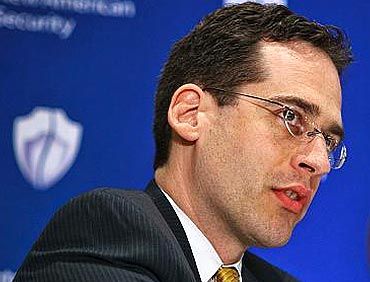
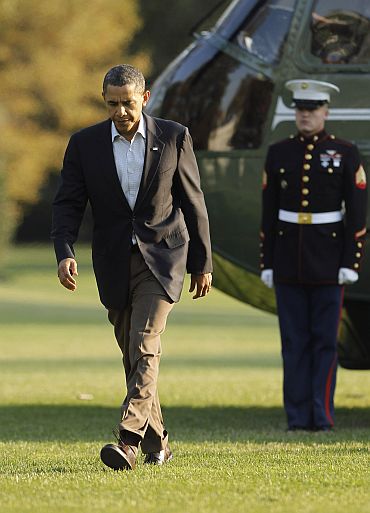
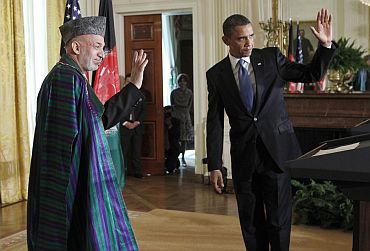
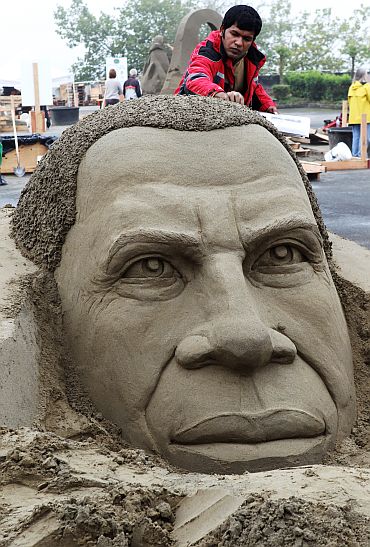
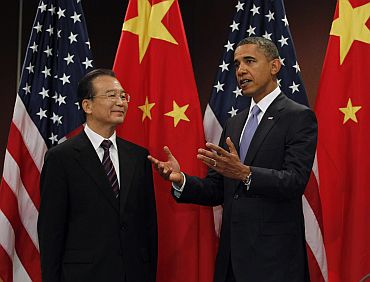
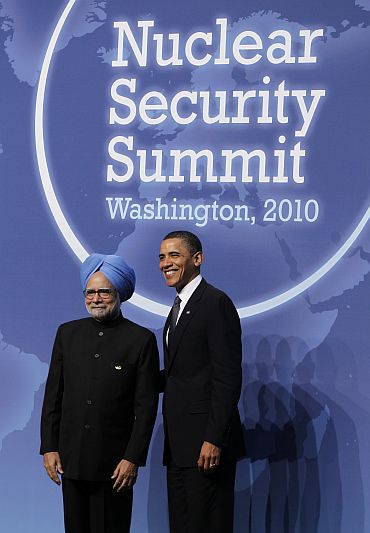
article